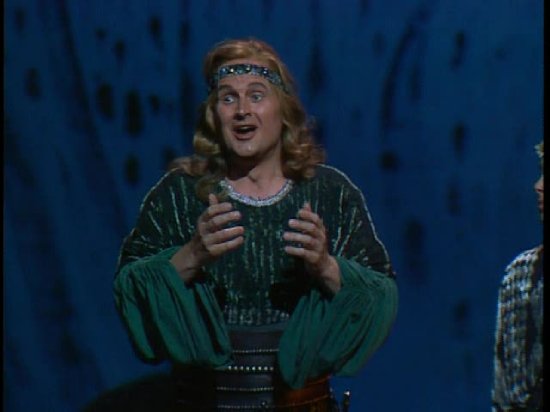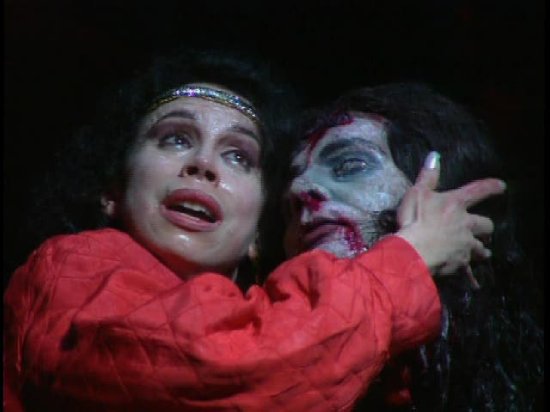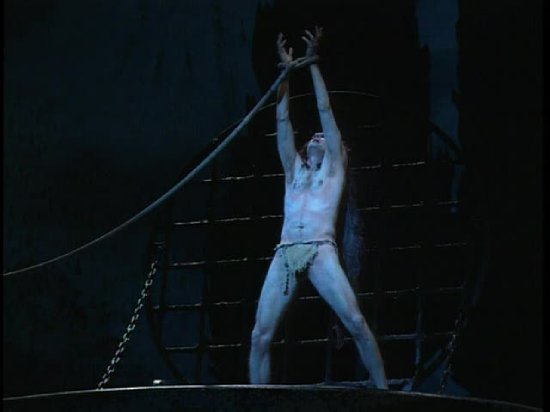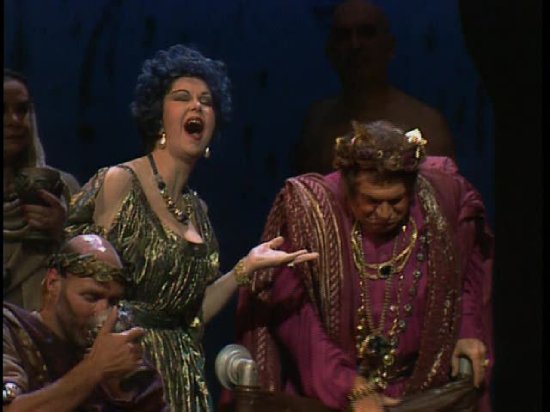Strauss, R: Salome (Downes)
Introduction
The July release of the famed (for possibly the wrong reasons) 1992 production of Richard Strauss's take on Oscar Wilde's 1891 play has taken on a special poignancy following the tragic death of both Edward Downes and his wife earlier the same month. It also, however, reinforces the fact that Downes was not just a master interpreter of Verdi, but can be considered one of the great Straussian conductors of our age.
This performance was first shown as part of the Opera on Four series, which marked Channel 4 out as being one of the more adventurous broadcasters at that time. Since then, things have gone downhill of course, but it's great to see Opus Arte releasing more of the ROH archive.
Audio
The PCM Stereo is very good, and favours the voices nicely, but much of the orchestral detail of Strauss's complex score is left to flounder, certainly in many of the climaxes. The orchestra also appears to have the largest basson section in the world. Either that, or there's a not-too-subtle increase in recording level following Jokanaan's curse. Either way, it sounds very impressive, if not very realistic.
Video
Originally recorded and broadcast for TV only, there are a few focussing issues, but the transfer is incredibly clean, and despite much of the set being in near darkness, the detail is admirably clear.
Conclusion
So, another trip into the mad, sadistic, and ever-so-slightly perverted world of Oscar Wilde's Salome and her twisted family.
Peter Hall's production is a far more 'traditional' take on things, with no updating into the Nazi-era as we saw in the ROH 2008 production. This is a refreshing change and we can now concentrate on the actual text without having to be reminded that it's not a very pleasant time to live in Judea by way of right-wing imagery and gratuitous nudity.
Speaking of nudity, this is the reason I mentioned that the production was famous for possibly the wrong reasons. Maria Ewing's (Salome) dance takes the idea of the seven veils fairly literally and it is a brave soprano who can strip off completely while performing a complicated dance. This is all part of the story though, and so the description 'gratuitous' is hardly appropriate. Ewing is probably the most sultry, erotic, and 'aware' Salome you are likely to see and her whole performance is hugely impressive throughout. There are times when the actual notes disappear into dramatic grunts, but it's an acceptable loss as the character's descent into madness (despite being almost there already) is tangible and Ewing is a great actress as well as a great singer. Her final scene, as she sings to the Baptist's severed head is both astonishingly beautiful and horrifying in equal measure.
The rest of the cast are also impressive, most notably Michael Devlin as Jokanaan, whose voice is lighter than some, but there is no loss of impact in the role. It's also nice to see that Salome's description of him as an ivory statue (and the rest) is reflected in the make-up and costume, what there is of it.
Kenneth Riegel (Herod) and Gillian Knight (Herodias) are splendid in their roles, she being the real power behind the throne, and he (with what appears to be one of those orange suntans you get from unmanned salons in the South Wales valleys), visibly changing from a monster into a gibbering wreck after the actions of, and demands from his step-daughter.
Robin Leggate as the lovelorn captain of the guard, Narraboth, sings with great passion, and brings a feeling of nobleness to the role, rather than sounding as if he is a just a useless plaything for the princess.
Edward Downes and the orchestra, despite a couple of issues (I was surprised at the clarinet intonation in the operning scene), create a soundscape that drags you into the opera straight away, and piles on the intense feelings as if your head is underwater, but there's no let up. Breathing is necessary of course, and I don't advise not doing so, but I doubt many people will be able to pause the action for a cup of tea, such is the immense quailty of the music-making.
Following the death of Edward Downes, there were the usual internet forums discussing the news, with many contributors mistakingly calling him a 'composer', but that may not actually be far from the truth. A great conductor is able to take a score and almost 'recompose' it, so that it sounds fresh and new. Downes was capable of this, and here, he creates a Salome that is exciting and memorable. The fact that I know noone who could say a bad word about him speaks volumes and I'm proud to say that I was lucky enough to work with him for a short time many years ago. The advice he gave that young(ish) orchestra is still remembered and put into practice by everyone who played then, and who have worked with him since. His legacy may not be as powerful as the Karajans or Soltis of this world, but as he said himself, he felt he was never going to get that sort of worldwide attention as he didn't have it in himself to be a complete bastard. He will be missed.




Your Opinions and Comments
Be the first to post a comment!